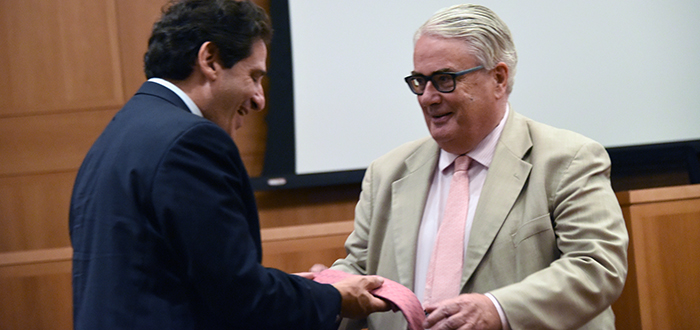Over the past two decades, Fordham Law School has forged sturdy ties with Ireland through numerous connections: participating in the peace process between the Republic of Ireland and North Ireland in the mid-1990s, instituting the ongoing Belfast/Dublin Summer Program in 2001, sending its students to clerk for the Irish Supreme Court, and inviting Irish Supreme Court justices to speak at the Law School. On Sept. 13, Irish Supreme Court Chief Justice Frank Clarke honored this special relationship in an appropriate way—with the presentation of a necktie—prior to delivering a speech about Ireland’s role in Brexit.
Clarke’s speech at Fordham came just six months after his colleague, Irish Supreme Court Justice Peter Charleton, addressed Ireland and Brexit at the Law School. In that time span, little discernible progress in negotiations between the United Kingdom and European Union has occurred.
The U.K.’s invocation of Article 50 of the Treaty on European Union in March 2017 triggered a two-year period of departure that forced Ireland, its fellow E.U. member states, and the world to brace for the U.K.’s withdrawal from the E.U. in March 2019. Negotiations thus far have failed to yield anything in the way of agreement, Clarke observed, raising the possibility that a transitional period, lasting until Dec. 31, 2020, will be necessary for further negotiations between the U.K. and E.U.
Whether the U.K. leaves the E.U. in the next six months or two years, Ireland will be prepared to maximize the opportunities and tackle the challenges it will face in its newfound post-Brexit role as Europe’s largest common law country, Clarke said.
Ireland is a known quantity among its E.U. peers and global trading partners: It will remain a common law country, one in which the ordinary language of the courts is English, and an E.U. member, thus making decisions reached in Irish courts easily enforceable throughout the E.U. In sum, these factors provide Ireland a significant edge—when it works with its common law partners from the United States, Canada, Australia, and India—that is not shared by any other jurisdiction in the E.U., Clarke said.
“Ireland can provide—not least for those outside the E.U. but also in the common law world—a safe haven in which to do business and in which to conduct litigation,” the chief justice said. “In a time of great uncertainty, I would like to believe that safe haven will prove to be a significant advantage.”
Before delivering his insights about Brexit, Chief Justice Clarke bestowed on Fordham Law Dean Matthew Diller the same pink Fordham Law tie, adorned with the letter F and surrounded by scales of justice, that Clarke wore on July 26, 2017, the day Irish President Michael Higgins appointed him chief justice.

“This tie is a memento of my relationship with Fordham,” Clarke told Diller, before delivering his speech, “Ireland as a Common Law Port,” in the Law School’s Gorman Moot Courtroom. Earlier in the day, Clarke also participated in Professors Michael W. Martin ’92 and Ian Weinstein’s Federal Litigation course, alongside U.S. District Court Judge Richard Sullivan, who had previously met the chief justice in Dublin as part of the 2014 Belfast/Dublin Program.
Diller returned the affection in his opening remarks, praising the Irish legal community in Belfast and Dublin for welcoming Fordham’s faculty and students, and thus creating the necessary conditions to form “deep bonds of friendship with members of the bar, the academy, and the bench in both cities.” Fordham’s summer program partners with University College Dublin in the Republic of Ireland and Queens University Belfast in Northern Ireland, offering a unique learning experience that connects the brightest young legal minds from the country’s southern and northern jurisdictions.
Clarke, an attendee of the summer program’s dinners in Dublin for the past several years, delights in mentoring and nurturing young students, remarked Martin, the director of the Belfast/Dublin Summer Program. Clarke, a University College alumnus, illustrated his focus on the profession’s future before his speech when he spoke in Martin and Weinstein’s class about comparative constitutional interpretation, sentencing and punishment views, and what style of advocacy works in the courtroom.
“For our students to hear that type of advice from that level is pretty extraordinary,” said Martin, who also directs the School’s clinical programs. Martin noted that earlier in the day the U.S. Senate Judiciary Committee approved a floor vote for Judge Sullivan’s appointment to the U.S. Court of Appeals for the Second Circuit.

